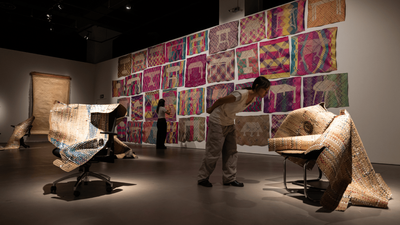It’s been an eventful few months for (a particular flavour of) feminism in Singapore. Two of this trio of incidents were no surprise: the rabid rush for tickets to Taylor Swift’s 2024 concerts, and the release of the hotly-anticipated “Barbie” feature film. The third was unexpected: the unprecedented success of a one-woman play by an emerging local playwright, starring a newish lead actress. Enter…“Psychobitch”.
When was the last time a Singaporean theatre production saw people queueing for more than eight hours to score one of only 20 standing tickets? For which an extra Sunday show added to meet booming demand sold out in five minutes but not before crashing Wild Rice’s website? For which tickets were scalped for three times their price? For which fan art exists?
Given these factors and the countless effusive endorsements on social media, “Psychobitch”’s success was established. Add to this: its lead actress Sindhura Kalidas is a close friend and its playwright Amanda Chong an acquaintance—both are also my ex-schoolmates; and, like me, its protagonist is a Singaporean Tamil woman in her early-approaching-mid 30s. I definitely went in with heightened expectations, looking forward to a robust discussion of what it means to inhabit these identities in personal, familial, romantic, and professional contexts.
“Psychobitch” is a one-woman play about Anya Samuel, an overachieving, 33-year-old Singaporean, Tamil, Christian journalist who’s been accused by Galven Low, her tech CEO fiancé, of being too emotional. Galven tasks her to explain why she has cried four times in public since they started dating. Anya rises to the challenge with a detailed presentation, complete with slides and animated infographics.
Over the next 90 minutes, Anya rehearses this presentation to the audience, in the privacy of Galven’s office, well before anybody is expected at work. We’re treated to a detailed play-by-play of Anya’s romantic relationship, against the backdrop of menstrual woes, insecurities about her partner’s ex, clashes with her well-meaning but strict pastor father for whom religion and values are inextricably linked, and more. What emerges is the narrative of one professionally successful woman’s journey towards realising her self-worth, but via a route so lonely that it lacks any community outside of the one baked into her life—her family.
Perhaps responding to a lack of meaty acting roles for brown women in Singapore, and with first-hand knowledge of Kalidas’s talent for both comedy and drama, Chong wrote “Psychobitch” as a one-woman play for her friend. It becomes a vehicle for the actress to depict her range and spirit, as she embodies with great energy a multitude of characters and voices in registers spanning from laugh-out-loud funny to deeply emotional, quiet moments. As she demonstrates power poses in front of Galven’s massive desk, manspreads in his chair, and reenacts scenes as varied as a boozy dinner date, intergenerational squabbles, jogging in the park, and valiant efforts to make soup, Anya emphasises how the angle of the story matters, and recounts, with candour and vulnerability, her perspectives to us, the captive audience.
On the one hand, this is empowering: flawed or even unlikeable as she seems in some moments, we still root for her as she comes to terms with how her partner’s emotional investment in their relationship is misaligned with hers, and considers the limits of her tolerance.
On the other hand, this one-way communication from Anya to us is limiting and sometimes frustrating: her experience of sexism and racism is discussed only in relation to her romantic partnership. I watched the play twice, on its opening and closing weekends. In both instances, my companions—also Indian women—and I were acutely aware of the moments that brought the audience to raucous laughter. At the risk of sounding like, you know, a psychobitch for policing others’ emotional responses, I felt a wave of resentment then. Granted, the sexism Anya encounters may be familiar to many viewers, but how much first-hand experience did they have with the racism?
Racist expressions in the play come from two characters. The first: a caricature of a bumbling Chinese property agent, who conflates ethnicity, language, and religion in heavily accented Singlish. And the other: Galven’s Cantonese mother, who derides Anya’s attempts at preparing chicken soup and Indians’ “Bollywood” propensity for “drama” to her son in one loud whisper. Even if Anya optimistically assumes the best of her future mother-in-law, it’s hard to imagine that a journalist of her age and experience wouldn’t have predicted the property agent’s reaction. “Psychobitch”’s depiction of the sexism and racism Anya faces is less inaccurate than incomplete, denying us insight into Anya’s related experiences outside the context of dating, and Galven.
Perhaps, because the play has set up an intimacy between Anya and the audience, viewers may root for her, rather than recognise the ways in which they may be part of the problem. It is a pity that “Psychobitch” stops at the most common sorts of racism a brown person in Singapore may encounter. By playing them for comic effect, the impact, whether intended or not, is not to emphatically decry racism so much as to present it as an object of ridicule. The “racist Singaporean” is presented as someone ignorant, who peddles simple stereotypes and blurts out prejudices without subtlety. The “racist Singaporean” is decidedly not someone who’s “educated”, “polished”, “eloquent”—like Anya and Galven, and the majority of the play’s audience.
There is plenty that Anya has given ample thought to with regards to her relationship. She has thought about being one half of a journalist-tech boss “power couple”. She has thought about the logistical challenges they face (staying over at Galven’s is frowned upon by her father, who considers it religiously unsanctioned). She has thought about the supposed perils of “geriatric pregnancy”. Yet, she seems not to have thought much about what it means to be an Indian woman dating a Chinese man—especially one close to money and status—in Singapore. Her only ex-partner referred to, Navin, is a member of the band at their Tamil Christian church; he knows how to say grace before meals; he is a primary school teacher. Anya states that she couldn’t see herself continuing their relationship because he never challenged her, while Galven does. But other than this, she appears not to compare her experiences with Navin in relation to Galven, while consistently compares it to Galven’s relationship with his ex, Cheryl. Did Anya feel a sense of cultural affinity with Navin? Was she spared the labour and pressure of explaining certain things to him and justifying them; like why staying over at her boyfriend’s was difficult? Did she spend time with Navin’s family and did they welcome her, as opposed to the way Galven’s mother treats her?
This leads to a burning question that I had throughout the play: As an extremely isolated character, who comprises Anya’s community? Or, to speak in her lingo—sis, where are your friends in all this? Outside of Galven, her father and grandmother, as well as the people she meets through work, Anya doesn’t mention interacting with anybody else on a regular basis.
Perhaps this self-professed Type A overachiever, with a “Level of Excellence: Perpetual. Level of Chill: NIL.” mentality, feels the pressure—especially as a Tamil Christian minority within an already minoritised Indian community—to keep her image pristine and to hide her struggles. But it’s incongruous that Anya, characterised as an overthinking, anxious person likely conscious of how she is perceived, would not include her reluctance to confide in others in an otherwise vulnerable monologue.
Could it be that she simply doesn’t…have any friends? I wonder if she even realises it and is in this sense a victim of girlboss feminism’s celebration of individual success and hustle. Galven’s flippant dismissal of her emotions as inconvenient and his lack of attention to her insecurities don’t help. But, it is still primarily Anya who has manufactured an imagined competition between herself and Cheryl, Galven’s ex. Anya stalks and judges Cheryl’s Instagram profile; she fishes for information about Cheryl even though Galven doesn’t mention his ex, and uses the details he shares to build a narrative in her head of Cheryl as a villain. Meanwhile, Cheryl, by all accounts, is happily married, pregnant and perhaps entirely unaware of Anya’s existence.
“Psychobitch” reaches its climax with Anya’s recount of her third instance of crying in public. At this point, she seems on the cusp of realising that she doesn’t need to explain away these “episodes” or to put up with Galven’s inadequacies. But then, the audience is thrown a red herring. Galven’s “red flags” aren’t limited to emotional distance. He has been physically violent with Anya. There were multiple hints pointing to such behaviour in the earlier parts of the play—“It’s never only one drink with Galven.” But the audience is still taken by surprise, likely shocked, due in no small part to Kalidas’s raw performance of the scene.
I am still conflicted about this, however. The late introduction of this crucial plot point made it difficult to glean whether Anya would have pursued her impulse to leave Galven—who has thus far been depicted not so much as an utterly reprehensible person but one whose shortcomings are, actually, quite common—without this factor influencing her decision.
This is where “Psychobitch” most resembles the feminism of Taylor Swift and “Barbie”. Solidarity in these universes is primarily formed around women commiserating in their shared disappointment in men, and the ways in which they are better than men, by virtue of not being one. This casual misandry is often articulated in simplistic language that has a rallying cry to it—“men are trash!”—that allows us to overlook the other differences it glosses over. What this type of feminism fails to account for is that most people—women, and also non-binary people—are capable of the same character flaws that Galven has exhibited. Anya herself is not immune to using language that pokes fun at people’s flaws and accrues easy laughs. Drawing attention to Galven’s paunch, for which she calls him “Pooh bear”, Anya jibes about “the body confidence of a straight Chinese man.” Galven’s personality presents numerous opportunities to poke fun at him, without having to resort to body-shaming.
The sudden escalation of Galven from self-absorbed, emotionally stunted man-child to abusive monster had troubled me, but not because it was impossible. Rather firstly, by turning it into a final-act reveal impacts the audience’s investment in Anya’s growth and expectations for what she should do next. Secondly, as with its treatment of racism elsewhere in the play, the script downplays the impact of emotional immaturity by making Galven’s behaviour an unfortunate exception rather than a norm.
In popular parlance, Galven does the gaslighting, and Anya does the girlbossing. The girlboss feminism that suffuses the play is on dismaying display even in its promotional materials, which have focused a lot on the accomplishments of its writer and lead actress. In the production’s official programme, Pam Oei attributed her enthusiasm for taking on the play’s direction to the involvement of its “super overachiever” playwright “RGS Girl No. 1” (Chong) and actress “RGS Girl No. 2” (Kalidas). How are these markers relevant to an individual’s capability in the realm of theatre, and why should it impress theatre-goers who are simply looking to watch a good play?
“Psychobitch” is pitched as a play about seeking to be accepted and understood for who we truly are—flaws and all—and to be loved regardless. These themes, which are apparent in Anya’s arc of self-discovery and growth, are made explicit in the play’s concluding moments. The effort to make it obvious often contributes to the detriment of its impact. One of the play’s last lines, “Maybe love is a consistency that doesn’t demand explanation even when we are erratic,” is immensely quotable and offers comfort and promise in its phrasing. While there are plenty of reasons to criticise Galven’s expectations of Anya, their trouble is perhaps not so much about him asking why she cried. It seems reasonable that if a couple is having drinks and a casual conversation, and one person suddenly starts crying, it would be natural to ask why, provoked by surprise, alarm or concern. It is, of course, how the question is asked, and what happens after, that counts for more.
Yet another line from Anya that strives for broad relatability: “I want to go somewhere I can be loved without having to make an argument for it.” For her, this is marked by a return to her father and grandmother’s home, which she had left, locked in a silent battle with her dad. Again, the sentiment is perfectly reasonable, even wonderful, after everything Anya has been through with Galven.
“Love lets you leave when you need to, but is always ready for your return. Love says: Come. Sit. Eat.” Given the centrality of religion to Anya’s family and to the play, it is not a leap of faith to interpret Appa’s awkward but consistent fatherly love as an analogy for divine love that accepts us as we are, forgives our flaws, and offers us a healing space. A return to the family home after a period of estrangement is a viable option for some, including Anya. But, in “Psychobitch” ready-made community of this sort seems idealised, due in large part to the depiction of Anya’s Paati as a stereotypical wise grandmother figure, who serves up not only fresh hot pooris but also peculiar analogies (she compares Appa’s cloying love to gulab jamuns).
To drive home the conservative view that the community we were born into—our family of origin—is one that always welcomes us back, the play introduces the “Parable of the Prodigal Son”. By this point, the audience has been taken on a rollercoaster ride of emotions: from laughing at both Galven’s inadequacies and Anya’s insecurities; to considering the sorrow of a child abandoned by her mother; to reeling when Galven’s true colours are revealed; to feeling guilty at considering the ways in which they might have been a prodigal child themselves. The introduction of an olfactory element delivers the final sucker-punch: the theatre is suddenly filled with the scent of Indian food. In case our minds were wavering as to or wondering how to respond to Anya’s journey, an evocative “curry smell”—commissioned from a vendor for the purposes of the play—makes a strong suggestion as it infuses the space.
Although “Psychobitch” features an isolated girlboss protagonist, it is community, the longtime friendship between the playwright and lead actress, that is central to its genesis. The popular response it has received also suggests the ways in which it resonates with viewers.
The play, with its depiction of a Tamil Christian female protagonist’s journey, is a meaningful addition to the array of narratives that depict the varied experiences of women in Singapore. Where Anya is a minority, she is also in the interesting and influential position of proximity to social capital as a successful journalist and, at the play’s outset, partner of a rich and upcoming tech-bro CEO. “I am a woman living in a world designed for men,” she says emphatically. Growth and maturity also entail recognising the ways that we live in a world designed for us, at the expense of others. Rather than foment guilt, it can also spur us to action, to seek out like-minded community.
As Anya’s narrative progresses, she casts off layers of her clothing—a structured blazer, a shirt, a vest—until she is left wearing a plain black tank top and pants at the end of “Psychobitch”. Having shed some emotional baggage, she gathers up her physical possessions and departs for home. I found myself wondering what was next for Anya Samuel, and how she would traverse the unexpected detour from the path she had envisioned. This is what I wish for her: warmth and safety at home, from which she can go out into the world and return to at the end of the day; emotional safety from which she can reach out to others and build community—authentic connections, with mutual interaction, rather than captive audiences whom she addresses unidirectionally from a platform.
Aditi Shivaramakrishnan works as an editor, writer and speech-to-text interpreter in Singapore. She has worked on art books, comics and young adult fiction titles at Difference Engine, Epigram Books and National Gallery Singapore. Her writing has been published in the Asian Film Archive’s Despatches, ArtsEquator, Esplanade Offstage, gal-dem, Portside Review, SEASONINGS Magazine and elsewhere.
If you enjoy Jom’s work, do get a paid subscription today to support independent journalism in Singapore.
Letters in response to this piece can be sent to sudhir@jom.media. All will be considered for publication on our “Letters to the editor” page.






